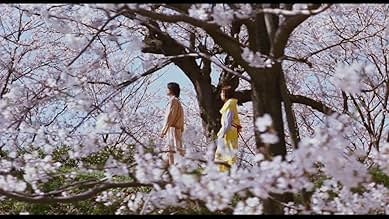AVALIAÇÃO DA IMDb
7,5/10
18 mil
SUA AVALIAÇÃO
Três histórias de um amor interminável.Três histórias de um amor interminável.Três histórias de um amor interminável.
- Prêmios
- 3 vitórias e 7 indicações no total
Kyôko Fukada
- Haruna Yamaguchi, the Pop Star
- (as Kyoko Fukada)
Enredo
Você sabia?
- CuriosidadesThis is the last Takeshi Kitano film to feature music by Joe Hisaishi. Kitano claimed that it became too expensive to hire Hisaishi for soundtracks while Hisaishi claimed that he didn't like the screenplay of the movie. Actually, they both had an argument about some pieces which weren't selected for the soundtrack, and where to put the others in the movie. They stopped working together since then.
- ConexõesReferenced in Ninguém Pode Saber (2004)
Avaliação em destaque
Praising or dismissing "Dolls" as pure aesthetics is just a banal way of labeling something that is beautiful which does not lend itself to immediate understanding. Just because any number of the meanings of the film don't jump out and bite the viewer is no reason to dismiss it as only aesthetically pleasing. We've got plenty of nature scenes and people starring blankly into space in cinema. They are not all masterpieces and "Dolls" would not be even half decent if that's all it was. If you feel the need to like this movie, then a better expression of this feeling is need than saying, "It's purdy."
As for myself I found there we several themes running through the film that merit investigation. First of all, the idea of hierarchy in relationships. In all the relationship there was a clearly dominant partner (yakuza, pop-star, groom) and a clear subservient partner (lady on bench, fan, discarder girlfriend). At the beginning of the film their supremacy is flaunted. They come and go as they please and treat the other member of the relationship flippantly and with little regard. They believe themselves to be the more powerful person in the relationship and think they are not as dependent on the so-called weaker member as the weaker member is on them. So times passes, some strange occurrences take place and whom do these people come back to? Who are the most important people in their lives? Those weaker partners. In the end, they and we realize that the stronger or more assertive member in a relationship is just as dependent on the weaker member as the weaker is on the strong. In this context they are seen as both playing roles essential to the relationship, the fact that one is more forceful than the other does not undermine the importance of the less assertive person¡¦s role. Of course this is not to be taken literally and applied to all relationships but it is a comment on or investigation of the idea of stronger and weaker partners in a relationship. The ultimate conclusion is a deconstruction of the hierarchy that shows the partners to be equal or at least codependent.
The next question is: "Why were all of these relationships unsuccessful?" My ascertation is that this plays into the strict nature of Japanese culture and Kitano's own morose sense of destiny, seen most vividly in "Sonatine". All the male characters make major life mistakes in the film. They attempt to rectify them by seeking comfort in the person they have wronged, or in the case of the blind man in the person with the closest connection. Why are they not allowed to start again? Why do they all fail? So many films are about starting over, that it's never too late to turn over a new leaf, old dogs can learn new tricks etc, etc. While I'm quite glad this is not the story of a spunky middle-aged former soccer mom who finds true love the second time around, I don't see the point in the absolute negation of the power of reconciliation. You'll have to ask Kitano about all that. I'm no Japanese cultural expert, though I have been there, but this seems to fall in line with the rather strict and unforgiving personality of Japanese society. If you've made a major mistake you have to accept it and take all the consequences willingly and bow to whatever your fate may be in response to those consequences. Kitano seems to embrace this idea of not being able to escape destiny in many films, I already mentioned "Sonatine" as a particularly poignant example of this.
I still think the ¡§Hanabai¡¨ is Kitano¡¦s best work, although watching a bunch of psychotic Japanese people run into walls and fall flailing into moats on Takeshi¡¦s Castle is good too. Dolls is interesting, worth a look and still better than 99% of films out there.
As for myself I found there we several themes running through the film that merit investigation. First of all, the idea of hierarchy in relationships. In all the relationship there was a clearly dominant partner (yakuza, pop-star, groom) and a clear subservient partner (lady on bench, fan, discarder girlfriend). At the beginning of the film their supremacy is flaunted. They come and go as they please and treat the other member of the relationship flippantly and with little regard. They believe themselves to be the more powerful person in the relationship and think they are not as dependent on the so-called weaker member as the weaker member is on them. So times passes, some strange occurrences take place and whom do these people come back to? Who are the most important people in their lives? Those weaker partners. In the end, they and we realize that the stronger or more assertive member in a relationship is just as dependent on the weaker member as the weaker is on the strong. In this context they are seen as both playing roles essential to the relationship, the fact that one is more forceful than the other does not undermine the importance of the less assertive person¡¦s role. Of course this is not to be taken literally and applied to all relationships but it is a comment on or investigation of the idea of stronger and weaker partners in a relationship. The ultimate conclusion is a deconstruction of the hierarchy that shows the partners to be equal or at least codependent.
The next question is: "Why were all of these relationships unsuccessful?" My ascertation is that this plays into the strict nature of Japanese culture and Kitano's own morose sense of destiny, seen most vividly in "Sonatine". All the male characters make major life mistakes in the film. They attempt to rectify them by seeking comfort in the person they have wronged, or in the case of the blind man in the person with the closest connection. Why are they not allowed to start again? Why do they all fail? So many films are about starting over, that it's never too late to turn over a new leaf, old dogs can learn new tricks etc, etc. While I'm quite glad this is not the story of a spunky middle-aged former soccer mom who finds true love the second time around, I don't see the point in the absolute negation of the power of reconciliation. You'll have to ask Kitano about all that. I'm no Japanese cultural expert, though I have been there, but this seems to fall in line with the rather strict and unforgiving personality of Japanese society. If you've made a major mistake you have to accept it and take all the consequences willingly and bow to whatever your fate may be in response to those consequences. Kitano seems to embrace this idea of not being able to escape destiny in many films, I already mentioned "Sonatine" as a particularly poignant example of this.
I still think the ¡§Hanabai¡¨ is Kitano¡¦s best work, although watching a bunch of psychotic Japanese people run into walls and fall flailing into moats on Takeshi¡¦s Castle is good too. Dolls is interesting, worth a look and still better than 99% of films out there.
- mid-levels
- 28 de abr. de 2003
- Link permanente
Principais escolhas
Faça login para avaliar e ver a lista de recomendações personalizadas
- How long is Dolls?Fornecido pela Alexa
Detalhes
- Data de lançamento
- País de origem
- Central de atendimento oficial
- Idioma
- Também conhecido como
- Bebekler
- Locações de filme
- Empresas de produção
- Consulte mais créditos da empresa na IMDbPro
Bilheteria
- Faturamento bruto nos EUA e Canadá
- US$ 4.067
- Fim de semana de estreia nos EUA e Canadá
- US$ 2.067
- 12 de dez. de 2004
- Faturamento bruto mundial
- US$ 5.405.725
- Tempo de duração1 hora 54 minutos
- Cor
- Mixagem de som
- Proporção
- 1.85 : 1
Contribua para esta página
Sugerir uma alteração ou adicionar conteúdo ausente
































